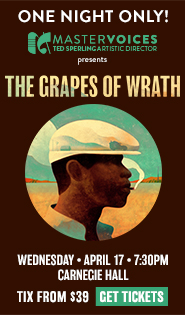Hampson muses, brilliantly, on war and death

Thomas Hampson performed songs of war and loss Monday night at Carnegie Hall. Photo: Kirsten Hoebermann
In classical music, the difference between art and artifact is made up by context. Playing music from eras that are culturally distant from us is like displaying Fabergé eggs; beautiful, dazzling objects that have no function and which only a rare few can own.
But give that music some meaning in terms of our own memories and cultural experiences, and it comes alive. No one in classical music does this better than baritone Thomas Hampson.
Monday night, Hampson and pianist Wolfram Rieger played new music that speaks to both our national experience and our current cultural moment, as well as old music that Hampson made seem immediately relevant. The songs on the concert were wide-ranging, and on paper the collection of composers—Strauss, Zemlinsky, Mahler, Hindemith, Ives, Jennifer Higdon, Bernstein—might have seemed scattered and aimless. But the program was instead completely thought-through and integrated.
The material comforts of contemporary American culture, and the separation between privilege and responsibility, are so great that it is easily forgotten that we have been at war for past a dozen years now, with a promise that we will always be at war. Hampson and Reiger played some explicitly martial music, but for the most part they gave the audience music that turned war from policy into consequence: loss, death, haunted memories. As Hampson remarked between the two encores—Barber’s “Sure on this Shining Night” and Hayden Wood’s WWI English popular song, “The Roses of Picardy”—“We have covered a significant amount of emotional landscape. We have remembered fallen friends and comrades.”
Hampson and Rieger did this through songs sequenced to make something close to a novel. Strauss set the stage with five songs, including two from the Op. 27 set and “Sehnsucht,” with its sensationalistic major seventh chords. These songs are about loss and mortality, but other than warming up Hampson’s smooth, mellow baritone—which shows no appreciable signs of age—they did little to indicate what was in store.
Singer and pianist next wove together “Mit Trommeln und Pfeifen” from Zemlinksy, Mahler’s “Revelge,” and Hindemith’s “O, nun heb dun an, dort in deinem Moor.” This was martial music that moved from bravado to irony, to the chilling conclusion of Hindemith’s song of mystery and death. Rieger’s playing was spectacularly effective.
Hampson is the great champion of Whitman in song, and several of the songs in the concert were ones he recorded on his great “To the Soul” album. Hindemith was followed by the commanding virility of Vaughn Williams “Joy, Shipmate, Joy!” and “A Clear Midnight,” then “Sing on There in the Swamp,” Hindemith’s English-language version of “Dort in deinem Moor,” is so radically different in method and tone that it doesn’t even seem to be the work of the same composer or poet. The first half concluded with the mellifluous bread and butter of Ives: “Tom Sails Away,” “The Things our Fathers Loved” and, the cornerstone for the whole night, “In Flanders Fields.”
The second half opened with the world premiere of Civil Words, a set of songs from Higdon, commissioned by Carnegie. These five songs are not only about the Civil War but use contemporaneous writers, from Anonymous to Lincoln. These are not just songs about loss, but the awful waste of war and its random murder: parents lose their children, a sentry is shot, Lincoln gives his final address before he is assassinated.
It was a sentimental, as well as murderous age, and Higdon took care to find some relatively dry, restrained voices. Her music is clear and straightforward, light on the melisma and dramatic gestures—though Hampson had room to tear it up—with mostly even rhythms. It’s skillful music, but not especially artful.
The epilogue began with Henry Burleigh’s “Ethiopa Saluting the Colors,” an ambiguous look at the social aftermath of the war. After the bitter passions of Civil Words, Hampson sang with great, gentle feeling. There were two Langston Hughes songs, “The Negro Speaks of Rivers,” composed by Margaret Bonds, and Jean Berger’s great “Lonely People.” Bonds’ song may not be a masterpiece, but Hampson sang it like one.
Throughout pianist Rieger was much more than an accompanist. The two men made music together, giving each other space to contribute their own thoughts about the music.
A true masterpiece finished the concert, Bernstein’s setting of an unpublished Whitman poem, “To What You Said,” from the composer’s Songfest. The poem is a confident, unobtrusive ode to gay love and a distillation of Whitman’s values and humanity. Bernstein’s song is one of the great art songs, of any time, in any language, and Hampson’s singing it is always one of the great experiences in music.
Stephanie Blythe sings Poulenc, Ferré, Brel, Britten and Coward, 8 p.m. May 15. carnegiehall.org



Posted Feb 12, 2015 at 1:13 pm by Sandra Schwadron
That was a thoughtful and well-written review ! Just one com-ment was made about Hampson’s voice – the rest of the review
described the program.
I heard the concert on WQXR and was very pleased.